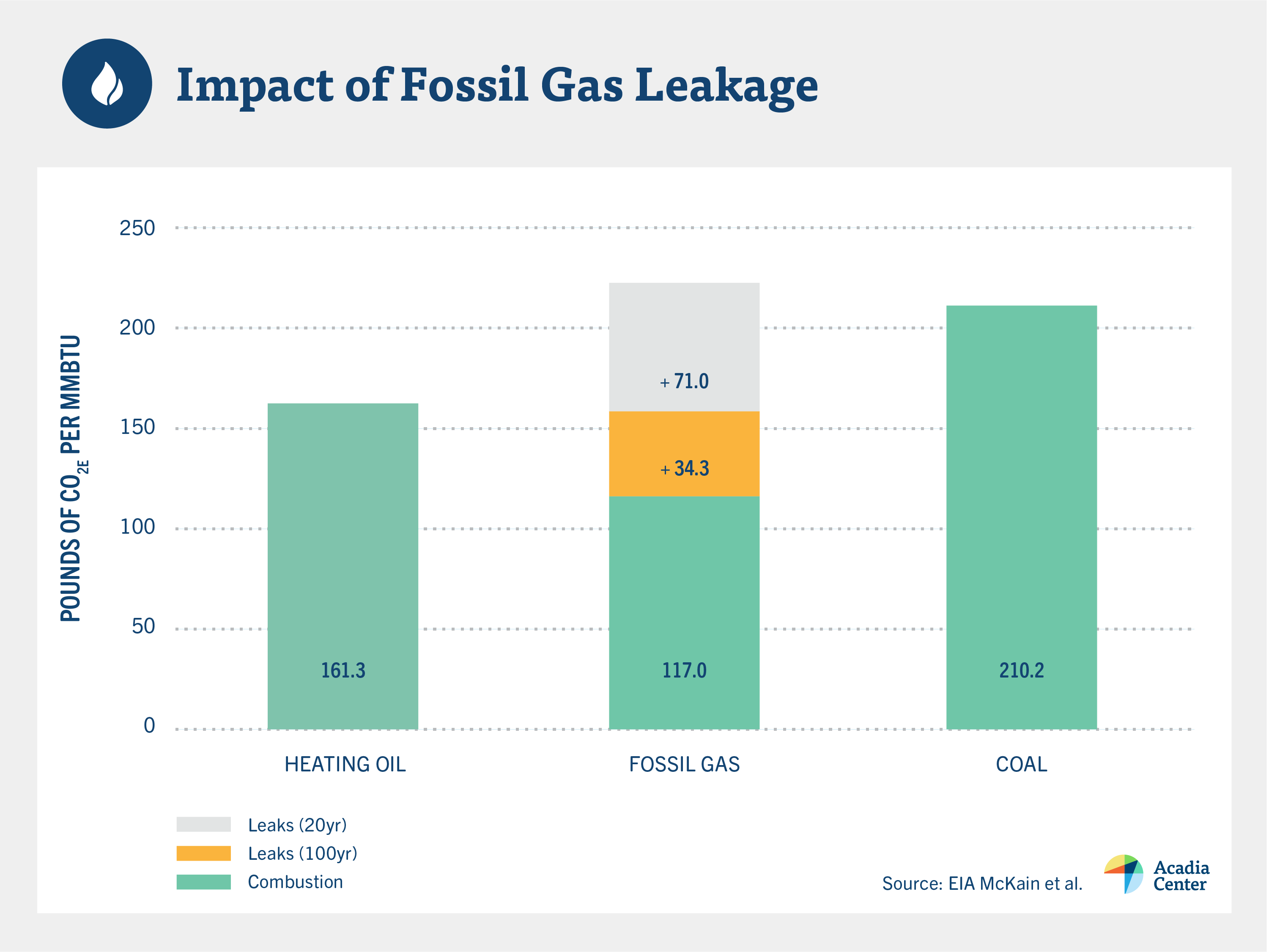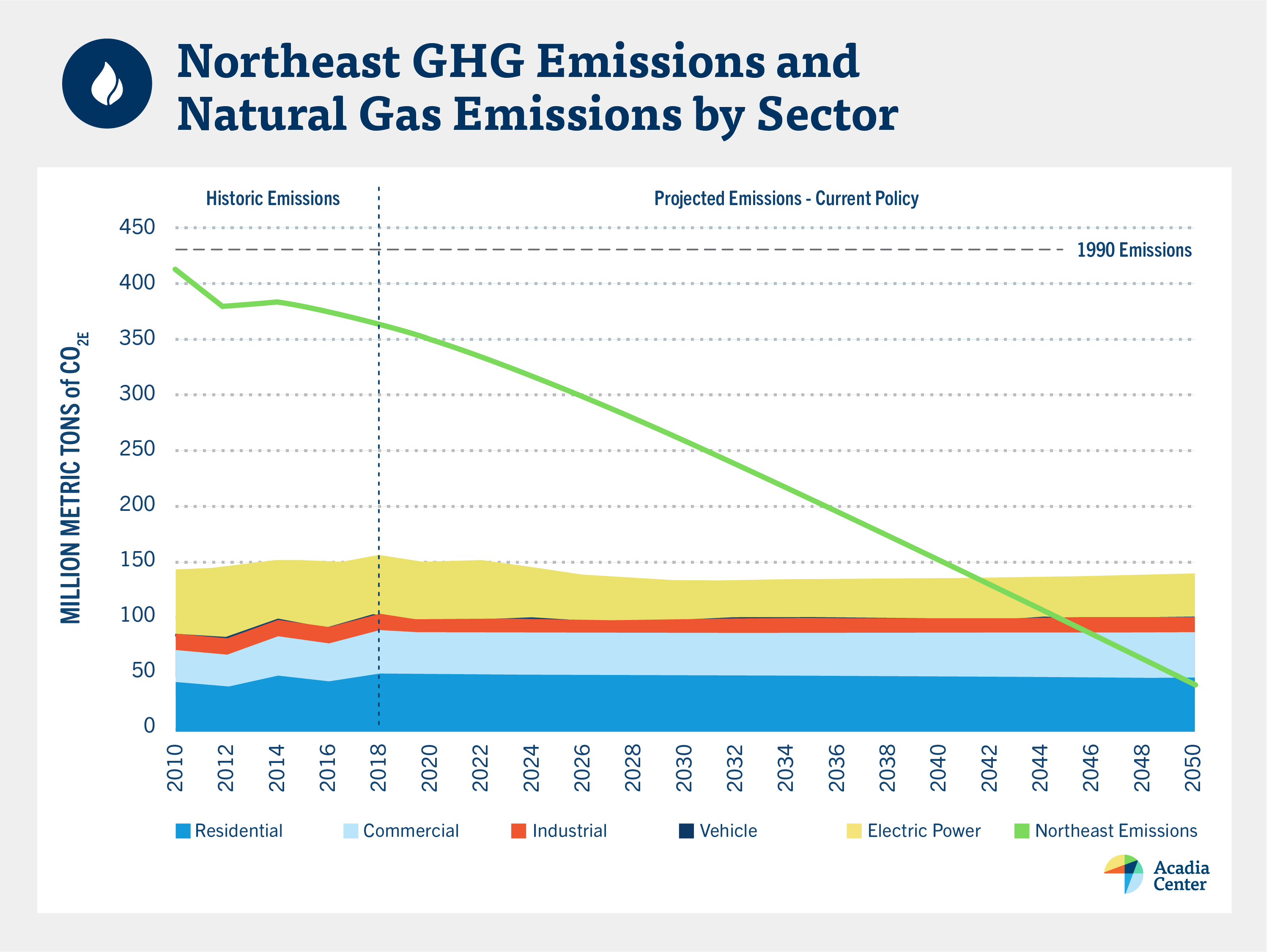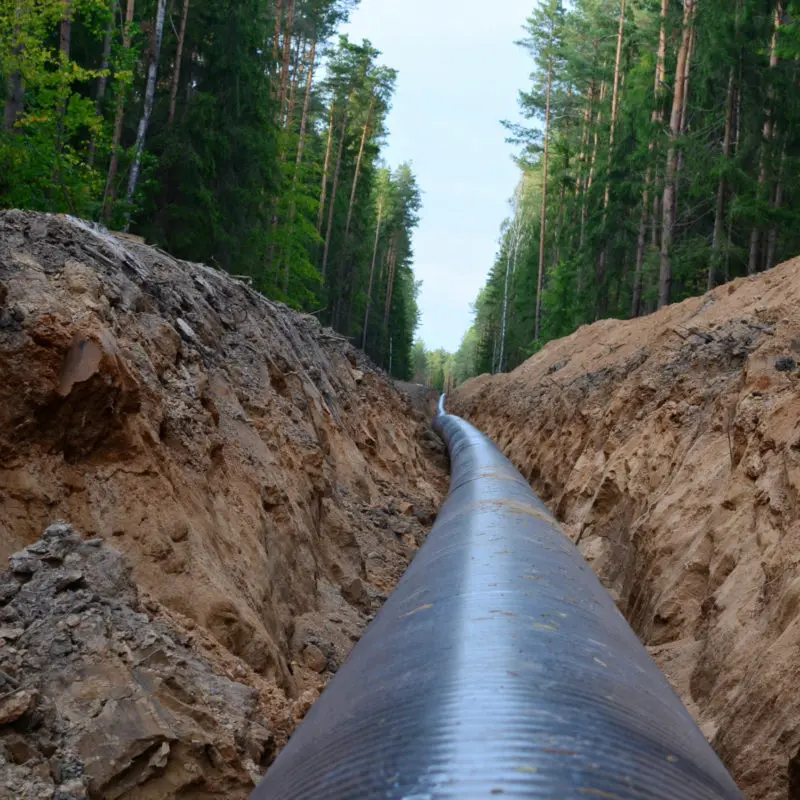Acadia Center’s Natural Gas Phaseout Program focuses on the need to end reliance on natural gas as a fuel source. The infrastructure that delivers natural gas throughout the Northeast region serves both the power generation and thermal heat sectors, and is used for electricity, building heating, and gas stoves. Acadia Center works to create policies that replace natural gas with cleaner, safer and more cost-effective alternatives like renewable energy for electricity generation, and electrified building heating and cooking options. The Natural Gas Initiative also works to reform the systems that create utility and fossil fuel incentives to keep building new natural gas infrastructure investments at massive ratepayer expense. Acadia Center is particularly focused on preventing additional gas expansion in the building thermal sector as it poses the largest risk to the climate and to public health and safety.
Acadia Center’s priorities include:
- Building broad coalitions to pressure state agencies and legislatures to plan for a transition away from natural gas to meet state and regional climate goals, improve public health and safety, and create new clean energy jobs.
- Working to demonstrate “The Declining Role of Natural Gas Power in New England” through analysis that finds new gas-fired power plants and related infrastructure are unnecessary and imprudent investments that would squander ratepayer money.
- Recommending specific policy actions cities and states can take to support adoption of clean heating technologies to reduce natural gas emissions, improve local and indoor air quality, and lower safety risks from carbon monoxide poisoning and explosions through publishing reports such as Clean Heating Pathways.
Intervening in targeted regulatory proceedings and stakeholder processes where Acadia Center’s voice has the most impact. Acadia Center consistently provides expert testimony and analysis to demonstrate heating and power generation needs can be met more reliably and responsibly with investments in non-gas alternatives like energy efficiency, electric heat pumps and renewable energy resources.
Gas Leakage and Climate Damage
Natural gas is mostly comprised of methane, an extremely potent greenhouse gas that leaks into the atmosphere at every stage of its journey, from generation to interstate transmission and distribution through local pipelines. Methane leaks are particularly problematic in the Northeast’s aging local utility gas distribution systems, parts of which are antique underground pipes dating back to the Civil War. Methane, when not combusted, has a global-warming potential (GWP) that is 28 times greater than carbon dioxide over a 100-year span. Methane is even more potent when looking at its initial 20 years in the atmosphere, with a GWP of 86 times that of carbon dioxide. In fact, when accounting for leakage throughout the gas distribution system, gas may be as harmful or worse for the climate than burning oil or even coal, as demonstrated in the chart below:

States in the Northeast cannot meet their legislated climate goals if they continue to rely on natural gas. Without significant policy changes, the current carbon dioxide emissions attributable to natural gas alone will far exceed the total carbon allowances for all fossil fuels by 2050, as demonstrated by the chart below. As states continue to accelerate their emissions reduction timelines to reflect the latest climate science, this problem will be further exacerbated, emphasizing the need for bold and immediate gas policy reform.

Yet fossil fuel interests in the region continue to advocate for gas expansion at ratepayer expense. Acadia Center meets these fossil fuel interests head-on with both political pressure and science-based analysis that offers an energy future that is cleaner, safer, and empowering for consumers. Acadia Center wages this fight through high-quality analytical publications, testimony in state legislatures, comments in administrative proceedings, presentations to community groups, and media opportunities.
Consumer Interest and Energy Resiliency
Nearly all of the natural gas the Northeast consumes for electricity and heating is extracted from outside our region. However, the Northeast has its own rich sources of renewable energy. By increasing renewable energy sourced from within the region, maximizing energy efficiency investments, and transitioning to electric heating technologies, the Northeast could keep billions more dollars circulating in the local economy and provide local employment.
Additionally, the high demand for gas during winter months (for both electricity and heating), means that consumers pay a premium in energy prices. Relying instead on low-cost, renewable, and reliable energy sources like solar, wind, and hydroelectric power provides energy security superior to imported natural gas. Lastly, it’s important to consider the high complexity and costs of restoring gas service after a damaging event. With climate change causing more extreme weather and natural disasters, a complex grid of fragile pipelines transporting gas over long distances is much less resilient than a grid relying on multiple local sources of renewable electricity.
Health and Safety
Methane, whether derived as a byproduct of oil production, fracking, or from waste sources like landfills and other waste systems, is an explosive fuel. The region’s distribution network of underground pipelines, valves, compressor stations, and storage facilities that delivers this fuel to homes and businesses is aging and poorly maintained. Leaks are common throughout the system and a buildup of gases in any given location could turn deadly in an instant. Human error is a significant concern and was a direct cause of both the Merrimack Valley explosions of 2018, the week-long Aquidneck Island gas outage of 2019, and multitudes of other gas explosions, fires, and evacuations.
These leaks are a public safety, health, and climate danger and leave the Northeast vulnerable to supply disruptions, price shocks, and heating outages. While fixing the most dangerous gas leaks should be an important regional priority, repairs to the entirety of the gas system merely to prolong the gas utility business model will add enormous costs to ratepayers. State regulatory decisions investing ratepayer funds should instead prioritize a transition away from natural gas and towards electrification that will make our communities safer, healthier, and more energy independent.
In addition to widespread methane leakage dangers, natural gas presents an ongoing public health concern even when burned successfully as a heating, cooking, or electricity generation fuel. In homes that use carbon-based fuels like natural gas, the threats of carbon monoxide are ever present and long-term exposure to fumes from gas use from heating and cooking have been linked to significant cases of respiratory and cardiovascular disease.
Equity
Natural gas infrastructure is prevalent in densely populated urban environments and surrounding areas with significant development. In many of the region’s communities on the frontlines of the fight for environmental justice, the exposure to fossil fuel pollution is constant. In addition to polluting the air indoors, gas fumes ventilated to the outside contribute to other air pollution from local gas-fired power generation stations and from vehicle tailpipes. Helping communities transition away from gas will help drastically improve the quality of life and reduce medical expenses.
As the region transitions away from fossil fuel use, and in particular natural gas, it is important to structure utility rates and incentives appropriately to ensure a just transition for all consumers and avoid price shocks. Acadia Center’s experience and presence in docket proceedings around the region are central to a responsible wind down of local gas distribution companies that will serve the public interest.




















